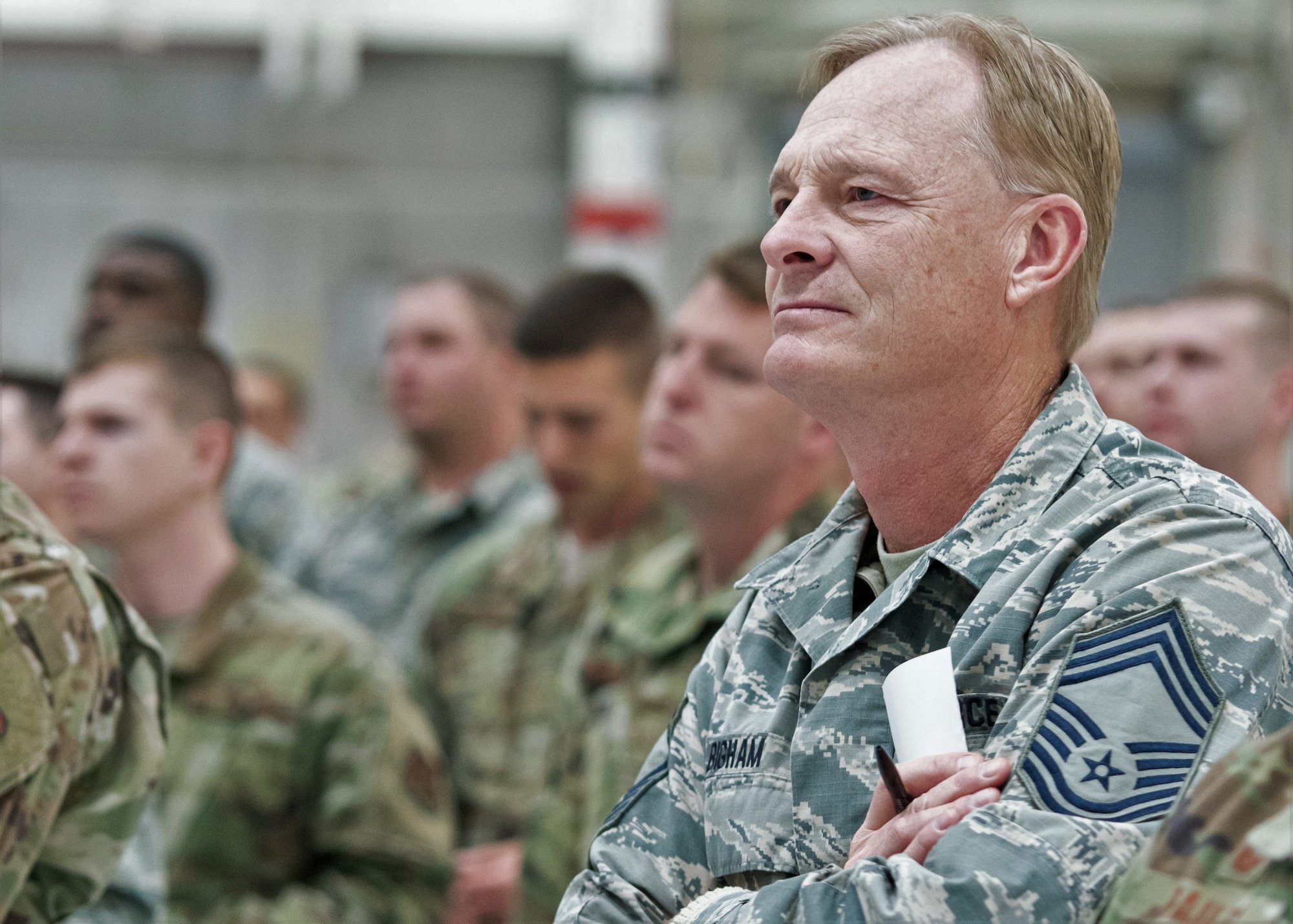As National Guard Suicides Drop, Outreach Programs Continue, Expand

Chief Master Sgt. John Bigham, a Missouri Air National Guard maintenance superintendent with the 139th Airlift Wing, listens to a speaker during a “Resilience Tactical Pause” day at Rosecrans Air National Guard Base, St. Joseph, Missouri. The event was focused on personal resiliency and suicide prevention. The Department of Defense’s 2019 Annual Suicide Report indicates suicide rates in the National Guard are lower, but more must be done to address the problem, insist senior National Guard officials. Photo by Tech. Sgt. Patrick Evenson
ARLINGTON, Va. – The suicide rate in the National Guard declined last year, according to the Department of Defense’s 2019 Annual Suicide Report, but Air Force Maj. Gen. Dawne Deskins said more work must be done to battle the problem.
Last year, the rate was 20.3 suicides per 100,000 people compared to 30.8 in 2018, said Deskins, who recently transitioned from her role as director of the National Guard Bureau’s manpower and operations directorate to her current assignment as deputy director of the Air National Guard.
Although encouraged by the decrease, she emphasized it will not lessen the Guard’s resolve in battling suicide.
“To me, these [rates] are people – these are Soldiers and Airmen, and losing one is one life too many,” said Deskins. She said she is “guardedly optimistic” about the decrease, but “we are keenly aware of how serious this problem is, and we want to get ahead of it.”
The NGB has expanded the Guard’s alliance with the Veteran Center Outreach Initiative, a Department of Veterans Affairs program that provides Guard members and their families more access to behavioral health services during training periods.
Capt. Matthew Kleiman, a U.S. Public Health Service officer and the NGB chief’s principal adviser on psychological health and resiliency, said the initiative helps Guard Soldiers and Airmen who live in remote locations.
“We can’t do everything ourselves. The Guard does not have an internal capacity to do everything that needs to be done,” he said. “We have to lean heavily on those kinds of partnerships.”
Compared to last year, Guard officials reported a 14 percent increase of Guard members receiving this veteran service during training periods, along with a 44 percent increase in the total number of Guard members accessing the services for the first time.
The NGB also continued to implement more pilot programs as part of the Warrior Resilience and Fitness Innovation Incubator (WRFII), a collection of programs managed at the state level “to enhance the readiness, wellness, and resilience of all” Guard members.
Kleiman said a key feature of the WRFII involves helping Guard units from different states better manage and implement initiatives.
“Before this innovation incubator got started, there was really no formal way for states to connect together in that meaningful way,” he said. “That’s part of our role at NGB – to not only help inform what ‘right’ looks like, but to connect states who are facing similar kinds of issues put solutions in place.”
Kleiman said these programs are only as good as the people generating the evidence and data. As a result, the NGB now has researchers available to help states better develop metrics for the programs.
“Prior to that, we really didn’t have a great way to say, ‘The mobile app that Utah developed is no better or worse than the mobile app South Dakota is developing,’” he explained. “Now, because we have the same group of technical support specialists working across all of the pilots, we can set up those metrics to do those kinds of comparisons.”
Also, the NGB is partnering with universities in rolling out Star Behavioral Health Providers, or SBHP. This program educates community-based behavioral health providers on military culture and deployment cycles while providing training of evidence-based treatments for post-traumatic stress disorder, depression, insomnia and suicidal behaviors.
“[The Guard] relies so heavily on our communities, and we know a lot of our members are going to go to those [civilian] community providers to get help,” Kleiman said, adding that the SBHP is a prime example of addressing suicide through a “local lens.”
Since October 2019, more than 700 providers have received specialized training through the program. Plans are underway, Kleiman said, to add more states.
In response to potential mental health risk factors stemming from the COVID-19 pandemic, Kleiman said the NGB has made mental health resources accessible to all Guard members regardless of their activation status.
In addition to the many initiatives and programs established by the National Guard, Kleiman said the involvement of Soldiers and Airmen at the unit level is also key in combating suicide.
He said questions like, “Hey, how are you doing? Is there anything I can do to help? Are you aware of these resources that are available” are just a few examples of what Guard members can ask when they suspect or know someone who needs help.
“It’s incumbent on everyone to take on that responsibility,” Kleiman said.
If you need immediate help, please call the National Suicide Prevention Lifeline at 1-800-273-TALK (8255). For more information on National Guard resources to combat suicide and promote resiliency, please log on to www.nationalguard.mil/Resources/Suicide-Prevention/.

Coffee or Die is Black Rifle Coffee Company’s online lifestyle magazine. Launched in June 2018, the magazine covers a variety of topics that generally focus on the people, places, or things that are interesting, entertaining, or informative to America’s coffee drinkers — often going to dangerous or austere locations to report those stories.
BRCC and Bad Moon Print Press team up for an exclusive, limited-edition T-shirt design!
BRCC partners with Team Room Design for an exclusive T-shirt release!
Thirty Seconds Out has partnered with BRCC for an exclusive shirt design invoking the God of Winter.
Lucas O'Hara of Grizzly Forge has teamed up with BRCC for a badass, exclusive Shirt Club T-shirt design featuring his most popular knife and tiomahawk.
Coffee or Die sits down with one of the graphic designers behind Black Rifle Coffee's signature look and vibe.
Biden will award the Medal of Honor to a Vietnam War Army helicopter pilot who risked his life to save a reconnaissance team from almost certain death.
Ever wonder how much Jack Mandaville would f*ck sh*t up if he went back in time? The American Revolution didn't even see him coming.
A nearly 200-year-old West Point time capsule that at first appeared to yield little more than dust contains hidden treasure, the US Military Academy said.












